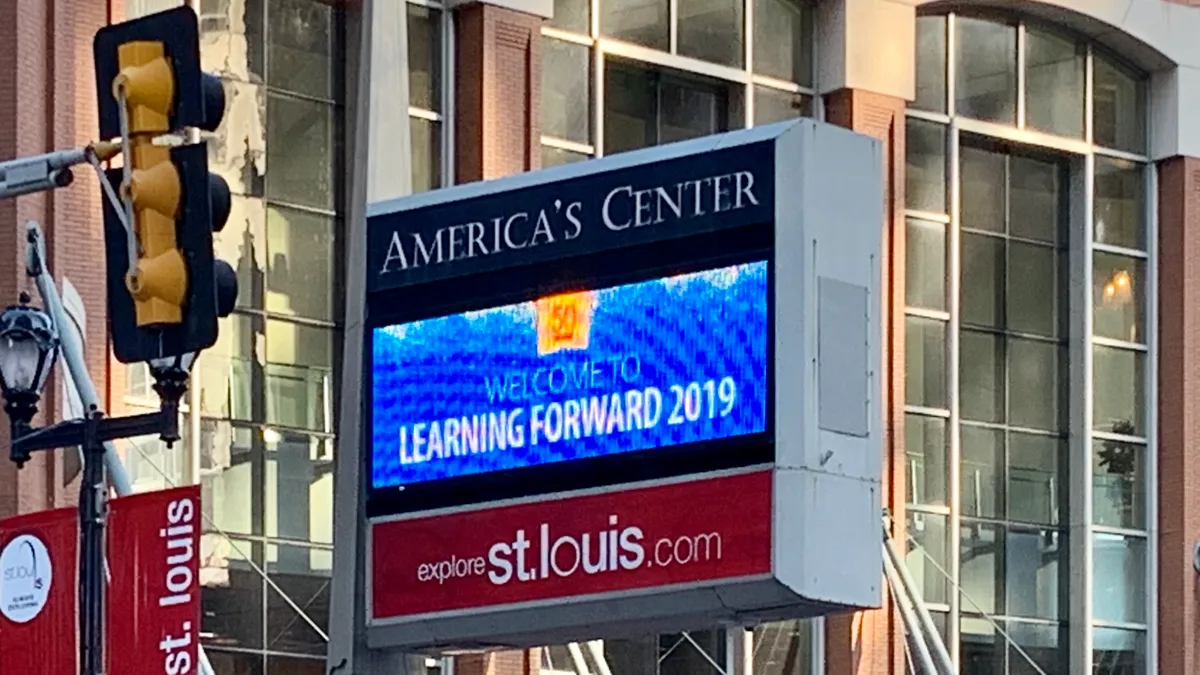ST. LOUIS — More black and Hispanic students are scoring above the basic levels on national tests than in the early 1990s, but many of these children still attend schools that are failing to educate them.
Those were among the takeaways Tuesday from two TED Talk-style addresses at this year’s Learning Forward conference.
“Progress is possible,” said Michael Petrelli, president of the Thomas B. Fordham Institute and the first to take the stage for the “EdTalks.” He pointed to trend lines showing steep declines in the percentages of minority students scoring below basic on the National Assessment of Educational Progress. And he coupled that with similar trends showing declines in child poverty rates.
“Things got better for children and families outside of school,” he said.
But then the recession hit, and the more recent downturn or lack of progress on NAEP is a reflection of that, he suggested.
“It was a calamity,” Petrelli said, adding that the Great Recession impacted the youngest students the most because they faced the “double whammy” of being born at time when their families had fewer resources and entering schools during a time of budget cuts and layoffs.
At the same time, states have significantly raised academic standards, he said, noting it’s taken roughly 10 years to have Common Core-aligned curricula.
While he didn’t reference the report, the Fordham Institute released a review Tuesday showing the websites many teachers use for supplemental materials are still “poorly aligned” with standards.
He also suggested the context in which scores like NAEP and those last week from the Program for International Student Achievement are released is important.
“If we pay too much attention to this narrative that none of this has worked, we will risk making more mistakes and that is to abandon promising efforts just as they are starting to bear fruit,” he said.
On the big stage making FHSD,MO and teachers proud. @ShellyParks5 #learnfwd19 pic.twitter.com/PVLIyXyoat
— Mary Hendricks-Ha (@maryhenhar) December 10, 2019
The importance of belonging
Howard Fuller, the founder and director of the Institute for the Transformation of Learning at Marquette University in Milwaukee, Wisconsin, presented another view, focusing on the inequities that remain in the education system for children of color because schools “were never designed to educate these kids.”
“At the end of the day, these kids that were suffering before you came here are the same kids who are going to be suffering when you leave here,” he said.
An advocate for charter schools who has criticized leading Democratic presidential candidates opposing them, Fuller discussed the three elements important in schools for students to succeed. The first is having a welcoming and caring environment so students can feel “this is a place that cares about me. This is a place I belong.”
The second component is forming relationships with students and giving them a sense of autonomy, he said, deriding school models with military-like practices.
“We don’t know how to develop relationships, so we try to control them,” he said, noting he heard about a school where students were not allowed to talk. “Who sat in a room and decided this was a good thing?”
Finally, students need to develop competencies they will need to succeed in life, he said. Fuller still teaches in a Milwaukee charter school that has been renamed for him.
In a follow-up Q&A led by Frederick Brown, deputy executive director of Learning Forward and Missouri Teacher of the Year Shelly Parks, a high school English language arts teacher, added her thoughts on how to create a more welcoming environment.
At Francis Howell North High School in St. Charles, Missouri, where she teaches, Parks said staff put up a photo of every student in the school and added a check mark if they knew the student’s name and a dot if they knew the student’s “story.” Those without checks or dots were a place to start.
Fuller focused on the audience at the conference, saying his school sets aside every Wednesday afternoon for professional learning so teachers have a “consistent time every week to get better at their craft,” he said. “To me the issue is how you get awesome results with regular people.”
Finally, Petrilli noted because of “dysfunction” in Washington, D.C., there are not a lot of top-down efforts to further change the education system, which gives states and districts an “opportunity to finish what we started.”






 Dive Awards
Dive Awards







